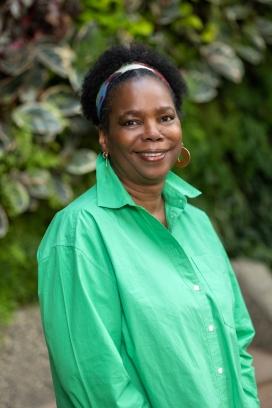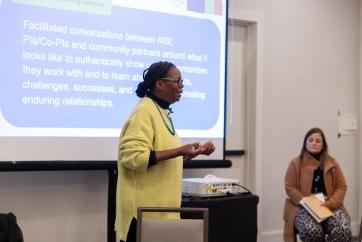Meet REVISE: Diane Miller
"The equity work going on will be more powerful when we come together in a single voice and shine a light on the incredible work that's already being done around the country."

We are excited to share our interview with Diane Miller, who is one of the co-principal investigators and the Director of Affiliate Programs and Research to Practice at REVISE. We also invite you to read the interview that CAISE completed with her in July 2020 to learn more about her work!
Can you please introduce yourself and give a little background about your current role at the Detroit Zoological Society and at REVISE?
My name is Diane Miller and I have been working at the Detroit Zoological Society for 10 years as the vice president of educational programming. Previously, I worked at the St. Louis Science Center as a senior vice president of school and community partnerships. I also coordinated an after-school time program for the California Science Center at the Museum of Science and Industry.
Throughout my career, I recognized that I needed to learn more science to do more science. I originally wasn’t comfortable with implementing science in my work. To do this I would reach out to colleagues and go to conferences looking at the work people were doing and then asking to work with them. This is how I met the people at TERC. I got involved in REVISE because colleagues sent me a description of the project. I was excited to hear more discussion about addressing issues of systemic racism and prioritizing equity in the informal sciences community.
What are you looking forward to accomplishing throughout this project?
Collaborating with the people who have reached out to us who are doing incredible intentional and equitable work. There's so much going on, but we've never had the opportunity to join together and have our voices heard. The equity work going on will be more powerful when we come together in a single voice and shine a light on the incredible work that's already being done around the country. I think that the resource center can focus on what's already being done with equity in the informal sciences field. We can share that with people who want to do similar work and with those who don’t get access to or don’t know about these opportunities. We’re creating a space for discussing equity that’s louder, clearer, and more inclusive.
What has been your experience with community partnerships?
Being in the community
"[The kids] thought only smart people knew science. Now that they were the ones learning science, it meant that they were smart by the end of the summer."
I learn how the community works by being part of the different communities . You can also build community and trust by exploring and talking to people, and realizing how engaging it could be if you explored it as opposed to just learning facts. My first program was with elementary school kids who lived in public housing in Los Angeles. I was told, “Yeah, we heard about that little science club you started. Those kids are idiots, and so are their parents.” I was told that the kids were not going to stay in the program, but the things that people told me about them didn't turn out to be true.
I would go down to community meetings to recruit kids. There was one parent in a meeting who asked how many kids I needed. When I told her I needed at least 20, she got those 20. These are the types of parents that can make things happen. And the parents who sent their kids just kept coming, and the kids took the class seriously.
Not only did they come, but other kids wanted to join when they heard about the program. They thought only smart people knew science. Now that they were the ones learning science, it meant that they were smart by the end of the summer. After the first year, when the kids went back to school, three of them got put in a gifted program.
They started watching science shows on TV. They would ask for supplies, and they started setting up little classes in their community to teach the kids who couldn't come. I told myself that I needed to take this two-year grant seriously. The kids take it seriously. It was impacting their lives in ways that I never anticipated. I learned that I needed to really be intentional about what I'm doing and make a difference and give these kids everything I've got.

Providing opportunities based on community demands
When I accepted the position in St. Louis, I said that I wanted to have a four-year youth program with high schoolers. You soon realize that high school students become part of your staff, but I needed four years to mentor them. I went to both the girls’ program at the YWCA and The Boys and Girls Club. I talked to them about the Science Center supporting the needs of the community around science education. I was told that there was no demand for science education in their community and that the kids learn science in schools. What they did want to know about what the Science Center could do about making sure that kids had a job after they finished school.
I took this information and created a program called Youth Exploring Science. Students started in January and would be put on the Science Center payroll in June, staying until they graduated from high school. They spent part of the summer exploring what it meant to go to college, part of the day included reviewing work skills and expectations including language. One of the work skills I taught included being comfortable working with diverse populations. We invited after school, summer schools, and community groups where people had different abilities and backgrounds to take a free science class in the summer. The staff from the different organizations would tell my students what they should know about their students to help them be successful when working with diverse populations. My students also took this seriously. They’d be learning science, and then they’d be teaching science.
How do you envision the role of the REVISE center to similar work that you’ve done in the past, and what our role is as a resource center in the Informal Science Community?
I think about this all the time. I've been partnered with Organic Oneness on this grant. Obviously all of the principal investigators are thinking about this, but Organic Oneness was included with the goal of thinking deeply about our community partnerships. One of the things we're thinking about is how we can introduce ourselves to community partners that are part of the grant or other partners in their community. We're looking to ripple out further and further from that core group. It's easier with an initial introduction. All it takes is one phone call from someone who knows someone for them to call me back and say, “Yes, we absolutely would love to work with you.” We're going to start off with what we know and what the community knows. I do believe that as we do this, the community is going to give us other suggestions. It’s always so surprising and if we really listen, I believe we'll come up with additional strategies based on community input.
Who would you like to see representing more and the informal Science community as a whole? Right now, REVISE primarily works with researchers and evaluators. How would you like to see that expand within those groups and in the community as a whole?
"There are so many spectrums that people identify across, and we just ignore them. But they’re doing practice and are trying to get things done. Listening to these voices that inform our work will help widen the community."
This is an NSF grant. You don’t write an NSF grant unless you do research. But I don't believe it has to just stop at people who are getting the NSF grants. So, I would like to first start with practitioners, because I started my involvement as a practitioner. Practitioners are the people who are actually taking the research to practice, these are the people who are actually doing the work. They're informing the research and they're running successful programs. Where is the role for practitioners? Maybe it's not in writing NSF grants, but maybe it's in reading or giving comments to NSF.
There are so many different types of practitioners that don't fall into the buckets of evaluator or researcher or project manager or Principle Investigator. I would like it if we started to look at the role of practitioners. When you think about people who are being excluded, there are so many spectrums that people identify across, and we just ignore them. But they’re doing practice and are trying to get things done. Listening to these voices that inform our work will help widen the community.
Finally, how would you define community, whether that's in the informal science community, or “community” as a whole?
I think of community as a group of people with shared interests, values, and vocabulary that makes them a community. I believe that anyone can belong to multiple communities. I just think it's sort of like an amoeba and has no true shape.
Thank you to Diane Miller for taking the time to share her experiences in the informal science community and her work with the REVISE Center.